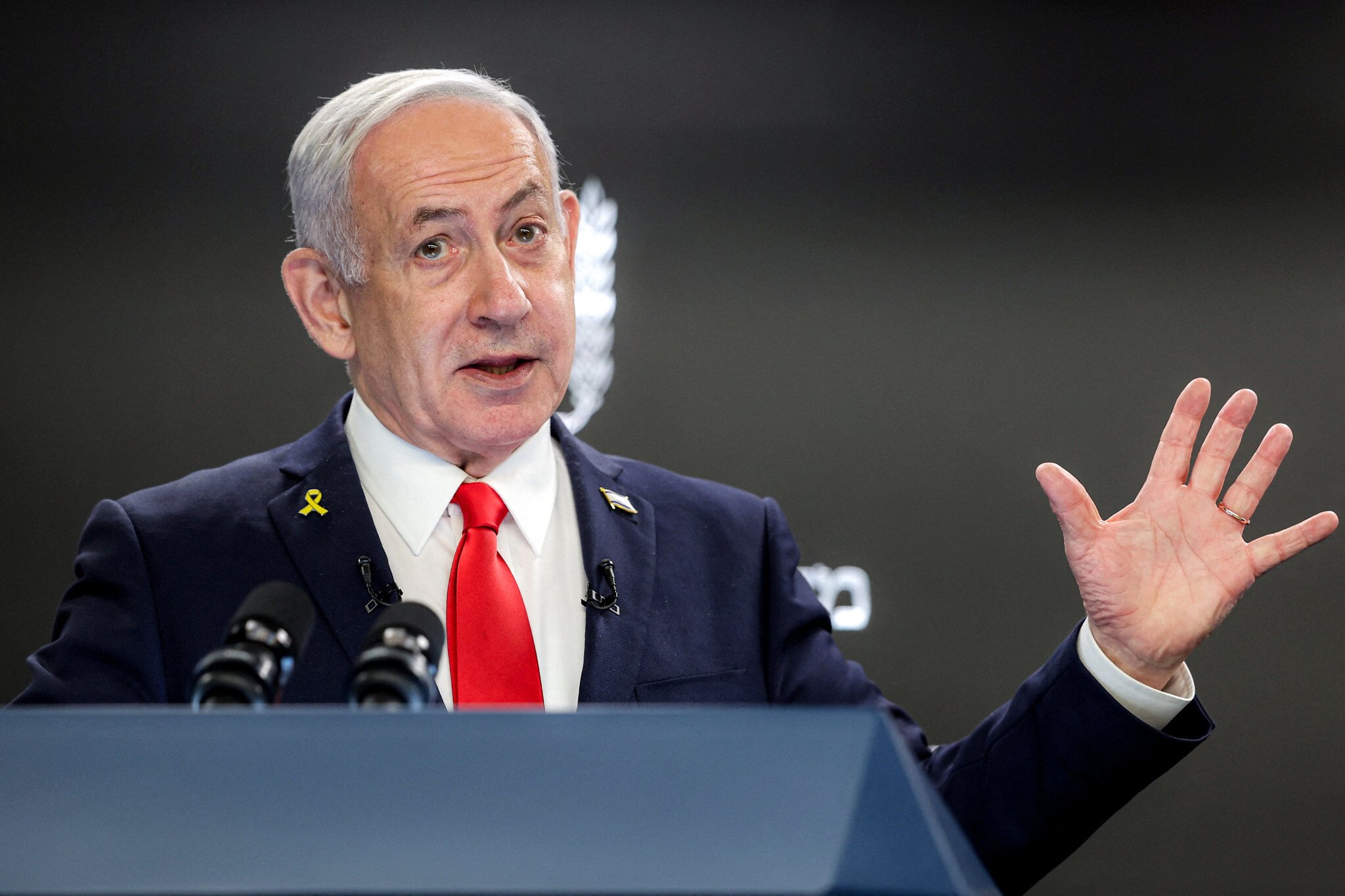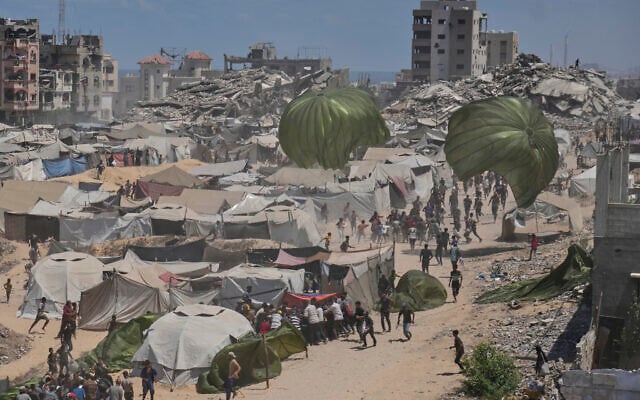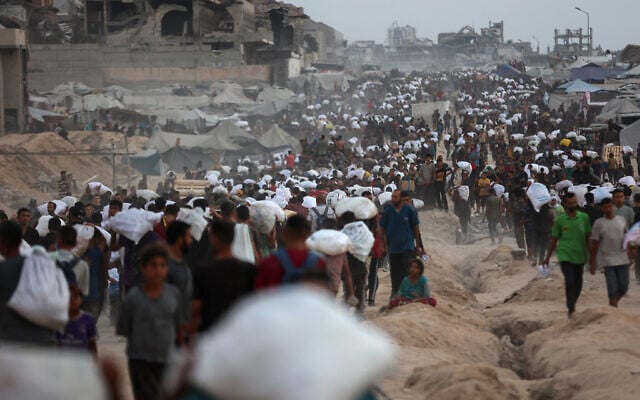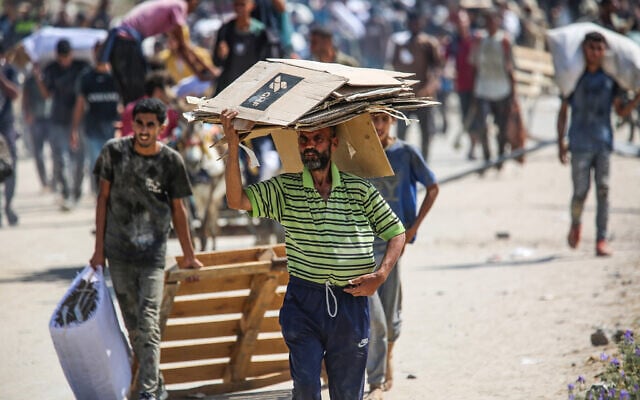



Prime Minister Benjamin Netanyahu rejected the accusation that Israel is committing genocide in Gaza, telling Israeli reporters on Sunday night, “If we had wanted to commit genocide, it would have taken exactly one afternoon.”
Netanyahu made the remark near the end of back-to-back press conferences he held with foreign and Israeli journalists, respectively, in which he also denied again that Israel has pursued a policy of starvation in the enclave.
Speaking to Israeli media, he falsely claimed that Israel had never halted all humanitarian aid to Gaza, even though his government had enacted that policy earlier this year.
Netanyahu made the two comments while defending his government’s recent decision to launch a major offensive in Gaza City. He said the plan will lead to Hamas’s defeat, but it has come under a tidal wave of domestic and international backlash.
Israel also faced global censure recently for widespread reports of starvation and deaths from malnutrition in the Strip. Netanyahu has repeatedly denied that Gaza is undergoing starvation or that Israel is seeking to create a humanitarian crisis there. Israel has also consistently and vehemently denied the charge — made by pro-Palestinian activists, some left-wing Israeli organizations and a number of countries — that it is committing genocide in Gaza, saying it makes efforts to avoid killing civilians whom Hamas puts in harm’s way.
“There is no starvation. There hasn’t been starvation. There was a shortage. And certainly, there was no policy of starvation,” Netanyahu said at the press conference. “If we had wanted starvation, if that had been our policy, 2 million Gazans wouldn’t be living today after 20 months.”
He continued, “It’s the same with genocide — if we had wanted to commit genocide, it would have taken exactly one afternoon.”

Earlier in the press conference, Netanyahu defended Israel’s approach to humanitarian aid in the Strip, which he said is now being overhauled. In recent weeks, Hamas-run local officials, in addition to international agencies and aid groups, have documented a rising number of deaths from starvation in Gaza.
Israel has disputed such claims, and blames Hamas for stealing aid and the United Nations for failing to distribute it. But facing international condemnation, Israel has put several measures in place to increase the flow of supplies.
At the press conference, Netanyahu was asked whether his decision earlier this year to halt humanitarian aid was a failed strategy to defeat Hamas.
“First of all, we need to understand what actually happened,” he answered. “We never said we were stopping all entry of humanitarian aid. What we said was that, alongside halting the trucks that Hamas was seizing — taking the vast majority of their contents for itself, then selling the leftovers at extortionate prices to the Palestinian population… we would stop this.”
In fact, on March 2, the premier’s office announced, “Prime Minister Netanyahu has decided that, as of this morning, all entry of goods and supplies into the Gaza Strip will cease.” He portrayed it as a way to stanch a source of Hamas profits and pressure the terror group into concessions.

He reversed the policy 11 weeks later, after heavy pressure from international allies, and backed the Gaza Humanitarian Foundation, an American-led initiative to give aid directly to civilians from four distribution points while bypassing Hamas and the UN. But the GHF drew harsh criticism because of near-daily killings near its aid sites and the difficulty people faced in accessing them.
On Sunday, Netanyahu said that approach had failed and “we didn’t have to get into this situation.”
“We didn’t want to create starvation here — on the contrary, we wanted to bypass Hamas’s looting and theft,” he said of the GHF. “Only it didn’t work as we wanted, it didn’t succeed because there weren’t enough points, etc., so we learned our lesson. We stopped it.”

He added, “Now, we’re acting differently. Aid is entering, we’re doing all we can so most of it won’t fall into Hamas’s hands, and in parallel, we’re really increasing the number of distribution points, the secure corridors, and the airdrops, airdrops that generally don’t reach Hamas.”
The international airdrops of aid have faced criticism for endangering people as they fall to the ground. Aid groups have said more supplies are needed to end widespread malnutrition in the Strip. Netanyahu has said aid would increase as part of the Gaza City takeover plan.
